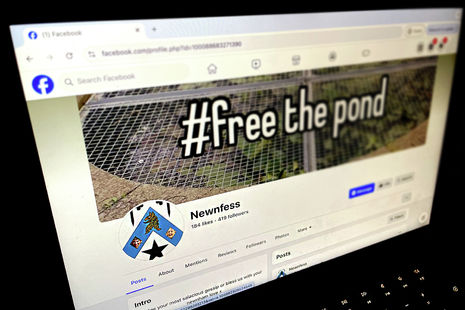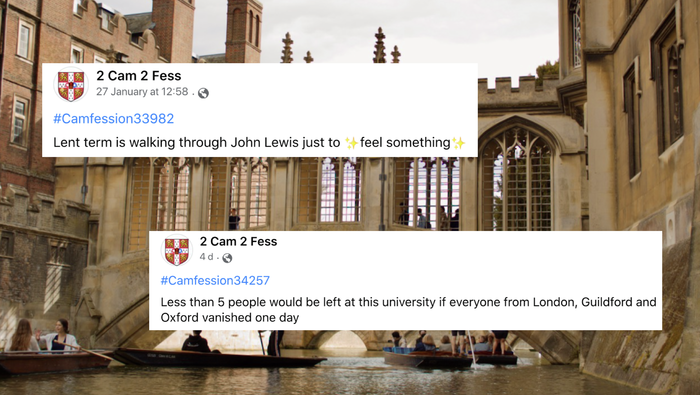Behind the firewall: the lives of college confession page admins
Lucy Thomas speaks to the elusive admins of the Facebook confessions pages that we know and love

From complaints about library noise to heartfelt confessions, Facebook college confession pages mirror every corner of student life. Name creativity varies, from Newnham’s ‘Newnfess’ to St John’s ‘Bridge of Highs’, but they all allow students to vent and share ideas anonymously.
However, this anonymity creates a complex set of challenges that are predominantly tackled by admins. Admins’ identities are usually veiled in secrecy, and they hold an almost omnipotent role, reading through all provocative submissions and deciding what gets posted. But is it really all it’s cracked up to be?
“There is significant moral pressure on admins”
I spoke to a number of admins, all wishing to remain anonymous. One was mainly positive about their role, highlighting the function of the pages in fostering a strong college community as a “space where experiences are shared.” For instance, during the summer vacation, these pages can be a valuable outlet for students to share difficulties faced at home and still maintain a connection to their college communities. The anonymous submission of ‘confessions’, typically sent via an online form, can also encourage students to voice complaints and personal struggles when they otherwise may not feel comfortable doing so.
The pages are also platforms that can call for change. “The JCR is quite responsive to serious confessions on the page,” I’m told. They are often rife with debate on issues within and outside College, and reflect the sentiment of the student body. When used correctly, they encourage democracy and free speech within College.
“This can reinforce the idea that some people are more ‘relevant’ than others in a college setting”
But are these pages always so constructive? This admin acknowledged the other side of the coin – that they can give people a space to be “really rude and confrontational with no consequences.” Whilst anonymity can be a valuable tool to create a comfortable space for students to express their thoughts, it can also mean that students submit unkind confessions that can target individual people. The lack of direct personal consequences from submitting a confession can mean that such issues are not resolved, but instead exacerbate tensions within College.
Multiple admins mentioned that the pages tend to “encourage cliques”. This does not always happen explicitly, but rather through repeated reference to a select group of people. This can reinforce the idea that some people are more ‘relevant’ than others in a college setting.
Such posts toe the line of anonymity – whilst full names are generally not allowed, “certain initials will be repeated time and time again, and it cements certain hierarchies and groups.” One admin mentioned “feeling guilty about perpetuating that through publishing these submissions.”
“Whilst admins generally seem to err on the side of caution, they also seem keen to avoid ‘censoring people and ruining the fun’”
There is, then, significant pressure on admins to maintain a positive balance. So, how much power do they have to filter submissions? One admin remarks on the responsibility that comes with these judgements: “We represent the college online so submissions should not damage the college reputation.” Another tells me that there is a rough set of rules – although these would “sometimes get flouted”. Some level of personal discretion, then, is held by admins as to what gets posted.
The foremost problem highlighted to me by admins was that it can be difficult to decipher whether a submission was made “in good humour or not”. Although one admin said that there is an implicit policy where “if we’re unsure, we don’t post it”, another mentioned that there were times when they thought that “posts were just silly inside jokes between friendship groups that no one would take seriously, and then they turned out to upset people.” It is very difficult to make an inherently subjective decision without full context, and in efforts to keep the pages light-hearted, there is significant moral pressure on admins.
Not wanting to cause upset is finely balanced with the wish to “reflect what is actually going on in college.” One admin drew my attention to the importance of “retaining an audience as a page.” Whilst admins generally seem to err on the side of caution, they also seem keen to avoid “censoring people and ruining the fun”. They are torn between the wish to provide a space for free speech, and to avoid causing real issues. For instance, whilst they want to air complaints about college institutions, they also feel a responsibility to “steer clear of submissions, particularly negative ones, about college staff and college structures.”
Maintaining anonymity is thus essential for admins to avoid the pages affecting them personally. One admin told me how once they partially lost their anonymity, the situation became “a lot more stressful”, and people would put pressure on them to “take certain things down”, or make assumptions about them “even if they were not a reflection of my personal thoughts or beliefs.”
The very anonymity that makes these pages so appealing and arguably important is also what poses such risks and difficulties to their existence. Admins occupy a seemingly impossible role, in which they must strike a delicate balance between freedom of expression and maintaining a positive and respectful community. The pages require thoughtful and careful moderation to remain a constructive force within college environments.
 News / CUP announces funding scheme for under-represented academics19 December 2025
News / CUP announces funding scheme for under-represented academics19 December 2025 News / Cambridge welcomes UK rejoining the Erasmus scheme20 December 2025
News / Cambridge welcomes UK rejoining the Erasmus scheme20 December 2025 News / SU reluctantly registers controversial women’s soc18 December 2025
News / SU reluctantly registers controversial women’s soc18 December 2025 Film & TV / Timothée Chalamet and the era-fication of film marketing21 December 2025
Film & TV / Timothée Chalamet and the era-fication of film marketing21 December 2025 News / News in Brief: humanoid chatbots, holiday specials, and harmonious scholarships21 December 2025
News / News in Brief: humanoid chatbots, holiday specials, and harmonious scholarships21 December 2025









